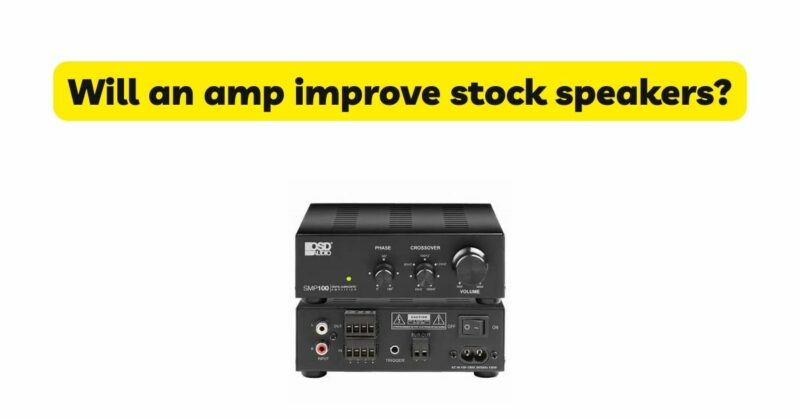Many car owners and audio enthusiasts find themselves pondering whether upgrading their stock speakers with a new amplifier can significantly enhance their in-car audio experience. Stock speakers, typically installed by manufacturers, are often considered the weakest link in a car’s audio system. While there is a common belief that amplifiers can breathe new life into stock speakers, the question remains: Will an amplifier truly improve the performance of stock speakers? In this article, we will delve into the topic and explore the potential benefits and limitations of pairing an amplifier with stock speakers.
I. Understanding Stock Speakers:
To comprehend the potential impact of an amplifier on stock speakers, it is essential to understand the characteristics and limitations of stock speaker systems. Stock speakers are factory-installed to meet cost constraints, design considerations, and mass production requirements. As a result, they are typically designed for average performance, with limited power handling, narrow frequency response, and often lacking in clarity and detail.
II. Power and Control:
One of the primary advantages of amplifiers when paired with stock speakers is the ability to provide additional power. Stock head units usually deliver modest power output, which may not be sufficient to drive speakers to their full potential. By introducing an amplifier, the speakers can receive a higher-quality and more powerful audio signal, resulting in improved dynamics, better control over the speaker drivers, and reduced distortion at higher volume levels.
III. Enhanced Sound Quality:
Stock speakers often exhibit limitations in terms of sound quality, including poor frequency response, lack of detail, and inadequate bass reproduction. An amplifier can help overcome these limitations by providing a cleaner and more robust signal to the speakers. The increased power allows the speakers to reproduce a wider range of frequencies with greater accuracy and clarity. The result is a noticeable improvement in sound quality, including better tonal balance, increased definition, improved instrument separation, and enhanced imaging.
IV. Distortion Reduction:
Amplifiers play a crucial role in minimizing distortion, which can significantly impact the overall sound quality. Stock head units may introduce distortion when pushed to higher volume levels due to their limited power capabilities. Amplifiers with low distortion levels provide a cleaner and more faithful representation of the audio signal, ensuring that the speakers reproduce sound accurately and without distortion. This reduction in distortion contributes to a more immersive and enjoyable listening experience.
V. Dynamic Range and Headroom:
Dynamic range refers to the difference between the softest and loudest sounds in an audio signal. Stock speakers driven by low-powered head units may struggle to reproduce the full dynamic range of music, resulting in compressed or flattened audio. Amplifiers with higher power output provide increased headroom, allowing stock speakers to handle dynamic passages with ease and faithfully reproduce the full range of sonic details. This results in a more engaging and impactful listening experience.
VI. Speaker Protection and Longevity:
Another advantage of using an amplifier with stock speakers is the potential to protect the speakers from damage. Amplifiers with built-in protection features, such as thermal and over-current protection, can safeguard the speakers from being overdriven and prevent them from getting damaged. The amplifier acts as a buffer, ensuring that the speakers operate within their optimal range, thereby prolonging their lifespan and preserving their performance.
VII. Limitations and Considerations:
While an amplifier can certainly improve the performance of stock speakers, it is important to acknowledge certain limitations and considerations. Stock speakers are designed to work within specific parameters, including power handling and frequency response limitations. Upgrading the amplifier without addressing these limitations may lead to potential issues such as speaker damage or distortion. It is crucial to select an amplifier that is compatible with the stock speakers and delivers the appropriate power levels and frequency response to avoid any potential negative effects.
Conclusion:
Pairing an amplifier with stock speakers can indeed improve their performance and elevate the overall audio experience in a car. The increased power, enhanced control, improved sound quality, and reduced distortion offered by amplifiers can breathe new life into stock speakers. However, it is essential to consider the limitations and compatibility between the amplifier and the stock speakers to ensure optimal performance and avoid any potential drawbacks. Upgrading the amplifier can be a cost-effective way to maximize the potential of stock speakers, providing a significant improvement in sound quality and a more enjoyable in-car audio experience.


